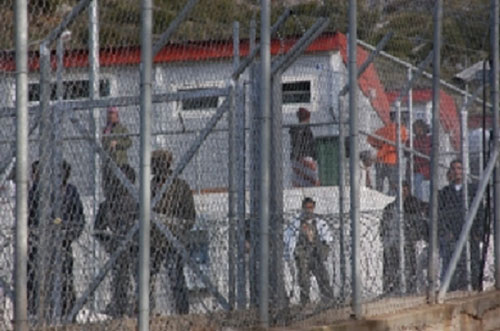
A young boy’s hope crushed under the wheels of a truck
A modern Greek tragedy: refugee rights abused
Reading time: (Number of words: )
Amir, a young boy like many others his age, fled thirty years of war in Afghanistan in 2007, to fight for his survival. After six months of travel, he finally managed to arrive in Greece. His family then thought that Amir was safe. Perhaps he too was happy and kept in his heart the hope of a new life— better and different, with wishes to rebuild and finally to "live." Like Amir, many other unaccompanied minors thought they would be safe as soon as they arrived in Europe. They had been taught that here, human rights were respected in full. They were mistaken.
For nearly two years, Amir lived under constant police violence in Greece, but he lost neither hope nor strength. Every night he and his friend, Hashim, hid under a truck to get to Italy, understanding that human rights in Greece were different from other parts of Europe. Hashim said one day they were hidden under a lorry, and when they got to the front of the check-in at the Port of Patras where the Lorries are loaded on the ships, the police had found him and made him turn back. Amir, was more "lucky," because the police missed him, and his journey continued.
Hashim’s thoughts were of Amir and his good fortune. He believed that at last Amir would find the things in Italy that fought for.

Hashim, is now crying, and not believing that his friend’s life could end in such a horrible and unfair way; but one part envied him: he at least no longer felt the pain, was not subjected to unjust violence or living with vivid memories of the horrors of war. Amir is finally at peace and his journey is over. He had been deported three times back to Greece from Italy. The final incident happened on 23 June 2009 at 15:30, under a passing truck in Ancona. Amir died after three hours in agony, at 18.30, amid a state of complicity.
The governments have to tell to his family that their son died because no immigrant is welcome in Greece— tell them that his death was due to being "different", an "immigrant", a "foreigner." This story took place after the closure of the Refugee Camps of Patras, which was decided by the Interim Minister of Greece to silence public opinion following the pressure applied by lawyers, journalists, and humanitarian groups. Now, the boys (unaccompanied minors), who had lived in the camp, hide by day in the mountains around the city. At night, they try to escape from a yet another country that wants to get rid of them.
Every day from the Port of Venice, Ancona and Bari many young people are deported to Patras, where they are arrested by Greek police officers and kept in containers for at least a week. In the containers, the police are free to practice their fantasied torture on them, using (as always) the only universal language they know: violence. It is not over yet for detainees, because many of these boys are brought to Komotiní, a Greek city on the border between Bulgaria and Turkey, another “paradise of Human Rights.” In this city, there is a prison where asylum seekers are piled up until they reach a sufficient number to be sent to Turkey and then to Afghanistan as a group. Last week 115 people were deported, 70 from Patras and 45 from Athena.
Three simple questions: Who pays the plane fairs for these deported boys from Turkey to their country of origin? Italy? Greece? Turkey? Or may be all of the three countries as they have good friendly relations?
Where are the UNHCR and the United Nations? In all these sorry events, where are they? Do they feel? Do they see? No, because blindness may be a convenient excuse, perhaps like being on a luxury holiday in Libya.

Poems for the Hazara
The Anthology of 125 Internationally Recognized Poets From 68 Countries Dedicated to the Hazara
Order Now








